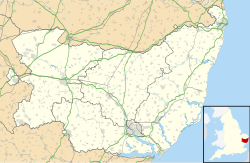History
Fisons
It would be 60 acres. The other research site of Fisons was Chesterford Park Research Station.
It was opened on Tuesday May 7 1957 by Sir Alec Todd FRS, a Scottish biochemist, [2] who won the Nobel Prize in Chemistry that same year for his important work on the phosphate structure of DNA, and attended by Sir Clavering Fison. [3] [4] [5]
Around three hundred people worked at the site and it was one of Europe's largest research institutes in the field of fertiliser.
Ownership
On 1 January 1960, Fisons Horticulture and Fisons Fertilisers were formed. The research site worked with both. [6]
The horticultural division of Fisons was sold off for £25.4m in a management buy out in 1994 known as Levington Horticulture; the division had around 280 people and around 26% of the UK market, turning over £47m. [7] In 1997 this division was sold on again to the present ownership.
Fertiliser
The research site developed the first specialist sports turf fertiliser; typical agricultural fertiliser was too concentrated: this is now found at all main golf courses across Europe under the Greensmaster brand. Levington Horticulture also made Turfclear herbicide, and had a Royal Warrant.
Directors
- 1957 (James) Anderson Storrow (1915-2003)
Visits
On Tuesday 1 May 1956, during construction, the site was visited by the Duke of Edinburgh. [8]
This page is based on this
Wikipedia article Text is available under the
CC BY-SA 4.0 license; additional terms may apply.
Images, videos and audio are available under their respective licenses.

